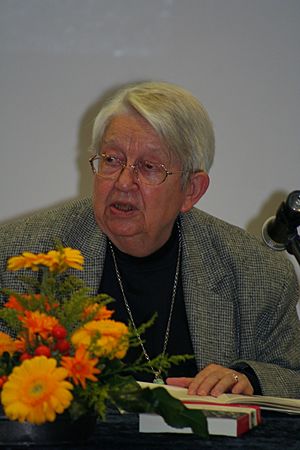Helga Grebing facts for kids
Quick facts for kids
Helga Grebing
|
|
|---|---|

Grebing at a book launch in 2009
|
|
| Born | 27 February 1930 Berlin, Germany
|
| Died | 25 September 2017 (aged 87) Berlin, Germany
|
| Political party | Social Democratic Party of Germany |
| Alma mater | Free University of Berlin |
| Scientific career | |
| Institutions | |
| Doctoral advisor | Hans Herzfeld |
| Doctoral students | Stefanie Schüler-Springorum |
Helga Grebing (1930–2017) was an important German historian and university professor. She taught at universities in Göttingen and Bochum. She mostly studied social history, which is about how people lived in the past. She also focused on the history of the labour movement, which is about how workers fought for their rights.
Helga Grebing's Early Life and Education
Growing Up in Berlin
Helga Grebing was born on February 27, 1930, in Pankow, Berlin. Her father worked in construction and was Catholic. Her mother was a factory worker who later sold food. Helga grew up in and around Berlin.
When she was five, her father died after a traffic accident. She then moved with her mother to Miersdorf to live with relatives. She went to school there, including a business-focused high school in Berlin-Neukölln.
School During World War II
The Second World War happened during her teenage years. In the last two years of the war, all schools closed. Helga worked in a factory in Wildau, making weapons parts. She also had to join the League of German Girls, a national youth group for girls.
She later said that her experiences in this group made her aware of how a dictatorship could return. This feeling grew after the Socialist Unity Party (SED) was formed in 1946.
Finishing School and University
The war ended in May 1945. In 1946, Helga finished school and got a qualification for office work. At 16, she was the youngest in her group. She saw a newspaper ad and joined the Workers' and Farmers' Faculty at Berlin University. This program gave her an extra year of academic high school.
In 1947, she earned her "Abitur" (a high school diploma). This allowed her to go to university. This special program helped students who couldn't go to university during the Nazi years because of their politics, background, or social class.
Helga then went to the main university. She studied history, German language and literature, philosophy, and civil law. In 1948, she joined the Social Democratic Party (SPD).
Moving to the Free University
After the war, Germany was divided into military occupation zones. Berlin was also split. Berlin University was in the Soviet zone. As political control grew there, Helga and many other students moved.
In 1949, she transferred to the new Free University of Berlin. This university was in the American (western) part of the city. She continued her studies there. At the end of 1952, she earned her doctorate degree. Her research was about a Catholic political party and working-class people in Germany.
Helga Grebing's Professional Life
Early Career and Teaching
From 1953 to 1959, Helga worked as an editor for a publishing company in Munich. She edited books and articles about modern history and politics. She also worked for an academic journal.
Starting in 1958, she taught at the Academy for Political Education in Tutzing. She also taught at other schools run by German trade unions and the SPD party. She helped train teachers too.
Leadership and Consultancy Roles
Between 1959 and 1961, she led an international student housing center. She was also active in a group for Social Democratic academics in Munich. From 1961 to 1965, she was a department head at the Munich Popular Academy. She was in charge of subjects like politics, sociology, history, economics, and law.
Between 1964 and 1966, she worked as a consultant. She advised the Hessen State Political Education Centre. In 1967, she began working on her habilitation dissertation. This is a higher academic degree needed to become a full professor in Germany. Her research was about conservative criticism of democracy in West Germany after 1945. She completed it in 1969.
University Professor and Researcher
In early 1971, Helga Grebing started teaching Political Sciences at Frankfurt (Main). Later that year, she became a full professor there. She then moved to the University of Göttingen in 1971, where she became a full professor of modern history.
At Göttingen, her research focused on social history in the 1800s and 1900s. She also helped manage the university as a member of its senate.
In 1988, she moved to the Ruhr University Bochum. There, she became a professor of the history of the international labour movement. She also led the university's "Research Institute on the European Labour Movement." She retired from the university in 1995 but continued to write books and articles.
Beyond the University
Besides her university work, Helga Grebing was a member of the Historical Commission of the SPD Party Executive. She also served on many other academic and arts groups.
She wrote biographies and helped manage the writings of other authors. In 2008, she published a biography of Willy Brandt, a famous German politician she had worked with earlier in her life.
Helga Grebing passed away on September 25, 2017.
 | Sharif Bey |
 | Hale Woodruff |
 | Richmond Barthé |
 | Purvis Young |

